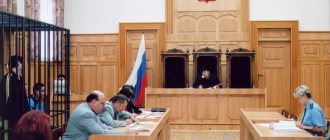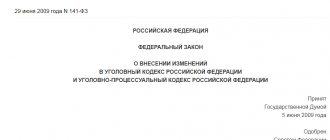Article 154 of the Code of Criminal Procedure of the Russian Federation. Separation of a criminal case
- An inquiry officer or investigator has the right to separate another criminal case from a criminal case into separate proceedings in relation to: 1) individual suspects or accused in criminal cases of crimes committed in complicity, in the cases specified in paragraphs 1 - 4 of part one of Article 208 of this Code; 2) a minor suspect or accused brought to criminal liability together with adult accused; 3) other persons suspected or accused of committing a crime not related to the acts charged in the criminal case under investigation, when this becomes known during the preliminary investigation; 4) a suspect or accused with whom the prosecutor has entered into a pre-trial cooperation agreement. In the event of a threat to the safety of the suspect or accused, the materials of the criminal case identifying his identity are withdrawn from the criminal case initiated and added to the criminal case against the suspect or accused, separated into separate proceedings. 5) individual suspects in respect of whom the preliminary investigation is carried out in the manner established by Chapter 32.1 of this Code, if in relation to other suspects or accused the preliminary investigation is carried out in accordance with the general procedure.
- Separation of a criminal case into a separate proceeding to complete the preliminary investigation is permitted if this does not affect the comprehensiveness and objectivity of the preliminary investigation and resolution of the criminal case, in cases where this is caused by the large volume of the criminal case or the multiplicity of its episodes.
- The separation of a criminal case is carried out on the basis of a decision of the investigator or inquiry officer. If a criminal case is separated into separate proceedings for the purpose of conducting a preliminary investigation of a new crime or against a new person, then the resolution must contain a decision to initiate a criminal case in the manner prescribed by Article 146 of this Code.
- A criminal case separated into separate proceedings must contain originals or copies of procedural documents relevant to this criminal case certified by the investigator or inquiry officer.
- Materials from a criminal case separated into separate proceedings are admitted as evidence in this criminal case.
- The period of preliminary investigation in a criminal case separated into separate proceedings is calculated from the date of the relevant decision, when a criminal case is separated for a new crime or against a new person. In other cases, the period is calculated from the moment of initiation of the criminal case from which it was separated into separate proceedings.
Article 157 of the Code of Criminal Procedure of the Russian Federation. Carrying out urgent investigative actions
- If there are signs of a crime for which a preliminary investigation is mandatory, the investigative body, in the manner established by Article 146 of this Code, initiates a criminal case and carries out urgent investigative actions.
- Urgent investigative actions are carried out by: 1) the bodies of inquiry specified in paragraphs 1 and 8 of part three of Article 151 of this Code - in all criminal cases, with the exception of criminal cases specified in paragraphs 2 - 6 of part two of this article; 2) bodies of the federal security service - in criminal cases of crimes specified in paragraph 2 of part two of Article 151 of this Code; 3) customs authorities - in criminal cases of crimes provided for in Articles 189, 190, 193, 194, 226.1, 229.1 of the Criminal Code of the Russian Federation; 4) commanders of military units and formations, heads of military institutions and garrisons - in criminal cases of crimes committed by military personnel, citizens undergoing military training, as well as civilian personnel of the Armed Forces of the Russian Federation, other troops, military formations and bodies in connection with the execution them in their official duties or at the location of a unit, formation, institution, garrison; 5) heads of institutions and bodies of the penal system - in criminal cases of crimes against the established order of service committed by employees of the relevant institutions and bodies, as well as crimes committed at the location of these institutions and bodies by other persons; 6) other officials who have been granted the powers of the inquiry authorities in accordance with Article 40 of this Code.
- After carrying out urgent investigative actions and no later than 10 days from the date of initiation of the criminal case, the inquiry body sends the criminal case to the head of the investigative body in accordance with paragraph 3 of Article 149 of this Code.
- After sending a criminal case to the head of the investigative body, the inquiry body can carry out investigative actions and operational investigative measures on it only on behalf of the investigator. If a criminal case is sent to the head of the investigative body, in which the person who committed the crime has not been identified, the investigative body is obliged to take investigative and operational-search measures to identify the person who committed the crime, notifying the investigator of their results.
Article 155 of the Code of Criminal Procedure of the Russian Federation. Separation of criminal case materials into separate proceedings
- If during the preliminary investigation it becomes known that other persons have committed a crime unrelated to the crime under investigation, the investigator or inquiry officer makes a decision to separate materials containing information about a new crime from the criminal case and send them for a decision in accordance with Articles 144 and 145 of this Code: the investigator - to the head of the investigative body, and the investigator - to the prosecutor.
- Materials containing information about a new crime and separated from the criminal case into separate proceedings are admitted as evidence in this criminal case.
Article 158.1 of the Code of Criminal Procedure of the Russian Federation. Restoration of criminal cases
- The restoration of a lost criminal case or its materials is carried out by order of the head of the investigative body, the head of the inquiry body, and in the event of the loss of the criminal case or materials during judicial proceedings - by a court decision sent to the head of the investigative body or the head of the inquiry body for execution.
- Reconstruction of a criminal case is carried out based on surviving copies of the materials of the criminal case, which can be recognized as evidence in the manner established by this Code and through procedural actions.
- The terms of inquiry, preliminary investigation and detention when reinstating a criminal case are calculated in the manner established by Articles 109, 162 and 223 of this Code.
- If the maximum period of detention in a lost criminal case has expired, the accused is subject to immediate release.
Article 159 of the Code of Criminal Procedure of the Russian Federation. Mandatory consideration of the application
- The investigator or inquiry officer is obliged to consider each petition filed in a criminal case in the manner established by Chapter 15 of this Code.
- At the same time, the suspect or accused, his defense attorney, as well as the victim, civil plaintiff, civil defendant or their representatives cannot be denied interrogation of witnesses, forensic examination and other investigative actions, if the circumstances for which they seek to establish are important for the given criminal case.
- In case of complete or partial refusal to satisfy the request, the investigator or inquiry officer makes a decision.
- A decision to refuse to satisfy a petition may be appealed in the manner established by Chapter 16 of this Code.
Legal commentary
As amended by the commentary to Art. 153 of the Code of Criminal Procedure indicates the following theses:
- Combination is carried out if a person appears as an accused in one case, and as a victim in another.
- Consolidation of criminal cases under the Code of Criminal Procedure of the Russian Federation is an optional action. This is not news, but a established pattern; the totality of the circumstances of each individual case, the importance of objective, timely action in the investigation are taken into account. Preliminary inquiry and criminal proceedings determine the need for combination. This concentrates the power and methods of analyzing investigations to the investigative body as much as possible. The detailed aspects of the legal violations committed or one violation committed in connection are also fully determined. Research into existing evidence is carried out efficiently, which ultimately saves time, effort and money.
- To base the connection, accomplices, victims, witnesses, defendants, civil plaintiffs or other involved citizens are not taken into account when their actions are disparate and relate to different legal violating actions, there are no signs of their involvement.
- Grouping legal cases into a single one is possible by the leadership of the investigative body after it issues the appropriate form of the decision. When legal cases are under the jurisdiction of several investigative bodies, the prosecutor leading the combined cases decides on their merger. Initiation of the combination is possible by the body of inquiry and the head of the investigation, since he directs and controls the progress of the investigation.
- The prosecutor issues permission to consolidate legal cases pending with the investigator.
- For connected cases, the production deadlines change; the longest of the preliminary investigations is selected. The smallest ones are absorbed for the longest period of time, then those that do not appear anywhere. A separate procedural document in this regard is not required.
To connect cases, it is necessary to prove the involvement of persons in the offenses committed. Only after the accusation can a combination be made.
But the edition of the commentary to the code also states that there is a law of exclusion that allows their association in relation to a suspect or unidentified persons.
The basis for combining cases is the involvement of different people in one violation, the connection of various actions with the same people.





